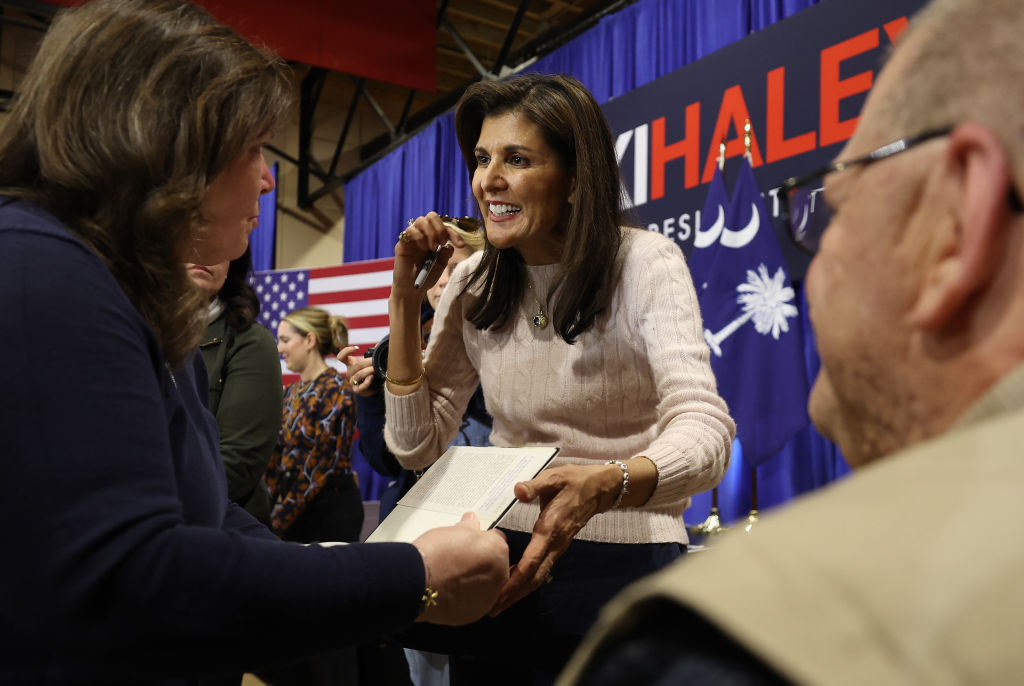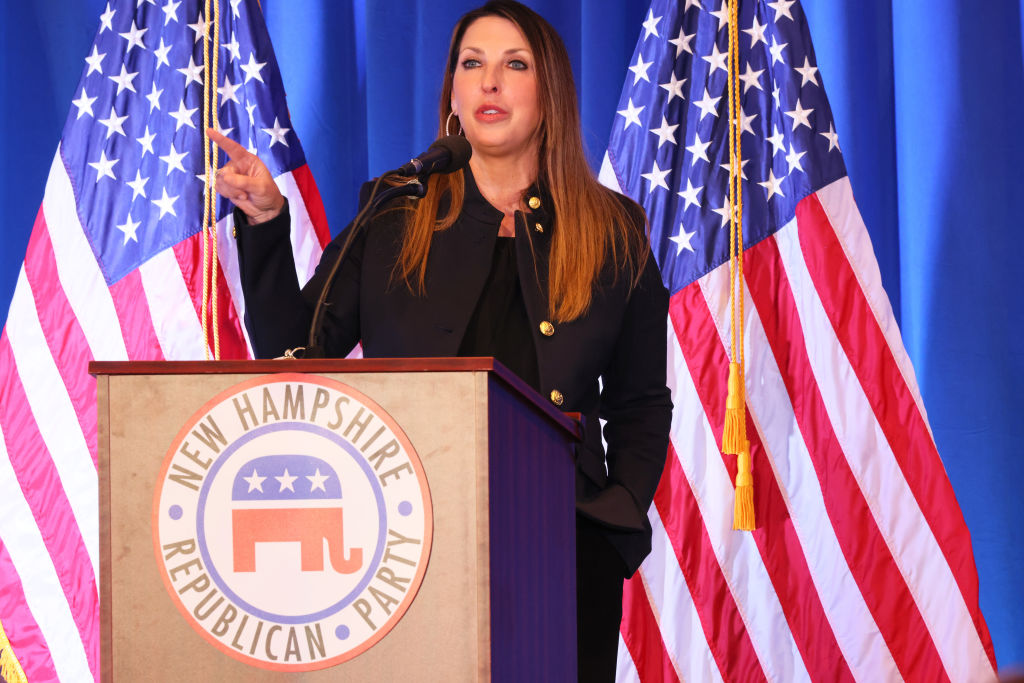Happy Wednesday! It looks like the grocery store in Russia that wowed Tucker Carlson is actually part of a French multinational chain—one that’s been accused of supplying Russian soldiers with goods during the war in Ukraine. C’est la vie?
Up to Speed
- President Joe Biden’s campaign announced Tuesday it had raised more than $42 million in January for his 2024 reelection bid, entering this month with a $130 million war chest. “January was our strongest grassroots fundraising month since launch—making it the third consecutive record-breaking month for grassroots fundraising,” the Biden campaign said in a press release, adding that its digital fundraising list grew by more than 1 million email addresses. The Biden campaign also said that the money it raised was given by 422,000 unique donors who made 502,000 separate contributions, with 97 percent of the cash collected coming in increments of under $200 each.
- Donald Trump, the likely Republican nominee, issued a campaign memorandum on Tuesday declaring rival Nikki Haley’s presidential campaign over as of Saturday, when the former president is expected to score a big victory in the South Carolina primary. “Like any wailing loser hell-bent on an alternative reality and refusing to come to grips with her imminent political mortality, we should expect more references to Kings and Coronations,” Trump campaign senior advisers Chris LaCivita and Susie Wiles wrote in the memo, “even though the results of 5 elections overwhelmingly sent an unmistaken message: Nikki Haley doesn’t represent Republicans any more than Joe Biden does.”
- Trump appeared in a Fox News town hall hosted by Laura Ingraham Tuesday night. When asked by Ingraham about the massive amount of money he owes across three separate civil lawsuits—more than $450 million in total after a verdict Friday in his civil fraud lawsuit—Trump likened his legal situation to the imprisonment and death of Russian dissident Alexei Navalny. “It is a form of Navalny, it is a form of communism or fascism,” Trump said. Navalny, who died at the age of 47 on February 16 in a Russian penal colony, was the face and heart of the political opposition to Vladimir Putin. After recovering from an assassination attempt by Russian agents in 2020, he returned to Russia the following year, where he was promptly arrested. The Kremlin has denied being behind Navalny’s suspicious death last week.
- Republican businessman Eric Hovde has officially entered the race for U.S. Senate in Wisconsin, giving the GOP a leading candidate in the primary to take on Sen. Tammy Baldwin, the two-term Democratic incumbent. A wealthy real-estate businessman, Hovde ran unsuccessfully for the Republican U.S. Senate nomination for the seat in 2012. He launched his bid with a 30-second video in which he said “everything is going in the wrong direction,” from the economy and health care to crime and “open borders.” Republicans are targeting Baldwin’s seat as a potential pick-up opportunity in a presidential election where Wisconsin is expected to be hotly contested.
Nikki Haley Burns the Boats

Few believed Nikki Haley last month when the Republican presidential contender told New Hampshire voters she wasn’t interested in being Donald Trump’s running mate, or when, after finishing in second place in the Granite State, she vowed to continue her longshot White House bid for at least another month, through the presidential primary in her home state of South Carolina and beyond.
Maybe they’re starting to believe her.
In a deliberate, sharply-worded speech delivered Tuesday afternoon in Greenville, South Carolina, Haley preempted questions about the status of her campaign in the event of an expected fifth consecutive defeat in the Republican primary after losses in Iowa, New Hampshire, the U.S. Virgin Islands, and Nevada by declaring that her quest for the Republican nomination will continue past Super Tuesday, presumably until the fight for the required 1,215 convention delegates officially concludes.
“I feel no need to kiss the ring. I have no fear of Trump’s retribution. I’m not looking for anything from him; my own political future is of zero concern,” Haley, the former South Carolina governor, said, during a 25-minute address that finally seemed to crystallize and explain her continued, and increasingly strident, opposition to the former president in whose cabinet she served as U.S. ambassador to the United Nations.
“I’m used to people questioning my intentions, so I’ll make a few things clear: Some people used to say I was running because I really wanted to be vice president. I think I’ve pretty well settled that question,” Haley added. “If I was running for a bogus reason, I would have dropped out a long time ago; the rest of the fellas already did that.”
Public opinion polls show Trump is on track for a big victory over Haley in South Carolina. And as the Trump campaign highlighted in a memorandum emailed to reporters Tuesday, the delegate math for Haley in her bid for the 2024 GOP nomination looks equally daunting.
The former president leads his last remaining primary opponent 63-17 in the race for delegates to the party’s July convention in Milwaukee, with 1,215 needed to secure the nomination. South Carolina is a winner-takes-all state, meaning Trump is likely to add another 50 delegates to his total on Saturday, with zero going to Haley. The Trump campaign estimates the 45th president will pick up another 114 delegates next week, 773 in the March 5, “Super Tuesday” primaries, and wrap up the nomination after contests scheduled for March 19.
“This is the diagnosis [Haley] refuses to accept: The end is near,” Trump campaign senior advisers Chris LaCivita and Susie Wiles wrote in the memo.
Haley is unusual.
Historically, most Democratic and Republican presidential candidates who faced similarly high hurdles—unlikely to win barring a political miracle—have long since dropped out. The money typically runs out by the time South Carolina votes, if not sooner. Preserving political standing inside the party for a future White House bid also is a concern that prompts an early exit. But as we reported for The Dispatch the day after Haley’s January 23 loss to Trump in the New Hampshire primary, and as Haley emphasized Tuesday, she doesn’t appear motivated by obvious future considerations.
Plus, the money has continued rolling in, from wealthy contributors and grassroots donors alike. Despite getting blown out in Iowa and losing by 11 percentage points in the Granite State, she raised a whopping $16.5 million in January. Her campaign reflects an operation that, despite these and other challenges, enjoys robust financial and grassroots support—even if it’s not enough to catch Trump.
Haley is slated to spend roughly $6 million on TV spots in South Carolina; her campaign announced a new ad buy in Michigan worth more than $500,000 in advance of the state’s February 27 primary; and she hits the road Sunday for a multi-state swing that will take her to Michigan, Utah, Virginia, North Carolina, Massachusetts, and Washington, D.C, after stumping recently in California and Texas. Haley’s super PAC, SFA Fund Inc., is also spending millions of dollars on her behalf.
For some veteran Republican insiders, Haley’s stubborn refusal to exit the race and make way for Trump is baffling. Curtis Loftis, the South Carolina treasurer first elected in 2010, the year Haley was elected to her first term as governor, claimed Haley is doing the bidding of her wealthy donors. “She’s a good campaigner,” Loftis, who endorsed Trump several months ago, told Dispatch Politics. “But she’s never going to stop until the money dries up.”
But there’s always the possibility Haley is simply driven by conviction; believes 2024 amounts to her best shot at winning the White House; and doesn’t believe quitting would be the right thing to do when so many traditional Republicans disaffected with Trump’s gradual, populist takeover of the party are imploring her to keep going. There’s also the possibility she figures it can’t hurt to stick it out while Trump, who turns 78 in June, is facing a tsunami of legal challenges that might yet imperil his front-running campaign.
“People have a right to have their voices heard. And they deserve a real choice, not a Soviet-style election where there’s only one candidate and he gets 99 percent of the vote,” Haley said in Greenville. “We don’t anoint kings in this country, we have elections. And Donald Trump of all people should know we don’t rig elections.”
The Coming RNC Turnover

Changes are coming to the Republican National Committee, likely just days after the March 5 Super Tuesday presidential primaries, as Donald Trump accelerates efforts to remake the party apparatus in his image.
The RNC’s spring meeting is expected to be held March 7 to 9 in Houston, according to two people familiar with the committee’s plans. This RNC business meeting would supplant a “training meeting” the RNC had scheduled for the same time period and location. As Dispatch Politics previously reported, this altered itinerary is an outgrowth of Trump’s push to replace RNC Chairwoman Ronna McDaniel, who is planning to resign after this Saturday’s South Carolina primary.
The RNC did not respond to a request for comment.
To get the ball rolling on officially changing up leadership, McDaniel has to issue a notice to the 168 voting members of the RNC that the March training meeting is being converted to a formal business meeting—and she must do so at least 10 days before it is scheduled to start. Figuring she does so, the 168 RNC members who gather in Houston, the site of the 2028 convention, would then cast votes on a new leadership team. All members of the Trump-backed slate are expected to be approved, although sources tell us there could be some pushback from McDaniel loyalists and others who object to what they see as a premature effort to turn the committee over to Trump before he has officially secured the nomination.
Politico first reported last week that North Carolina GOP chairman Michael Whatley is Trump’s preference to succeed McDaniel. Trump is also backing his daughter-in-law, Lara Trump, as RNC co-chair, and his campaign’s senior advisor, Chris LaCivita, as the committee’s chief operating officer. The expected shifts at the top of the RNC have been accompanied by reports of more personnel changes, including what the Daily Beast called a coming “purge” of supposed anti-Trump elements in the staff and even among the 168 voting members.
It’s not clear how swift or effective such a purge of members would be, given that all 168 are elected to their posts by members of their state or territorial party. And despite Trump’s popularity and power within the party, the RNC remains an insular organization empowered by party activists at the state and local level where even the former president’s reach has limits. Just last week, in fact, the Alabama GOP elected a new committee member, a local county chairman named Bill Harris, over the incumbent committee member, Paul Reynolds, and John Blanchard, a candidate who had been endorsed by Trump.
And despite expectations that Trump’s picks to lead the RNC will earn the support of a majority of the 168 members, there is some grumbling behind the scenes that the moves are happening too quickly—long before most Republican primary voters have pulled the lever and while another major candidate, Nikki Haley, is still in the race.
“By the end of March they could probably do all this, and there’s not a legitimate argument against it,” one RNC source told Dispatch Politics. “Doing it in early March, you still have the majority of delegates to be determined? Who decides when a primary election is over? One of the candidates, the RNC—or voters?”
Pro-Trump critics of the current RNC, especially McDaniel’s leadership, include former White House aide Steve Bannon and Charlie Kirk, the 30-year-old founder of the student activist group Turning Point USA. In particular, Kirk’s behind-the-scenes machinations and controversial remarks have made him a target of even some within Trump’s orbit, as RealClearPolitics and NBC News recently reported. At the committee, there is plenty of frustration with what some view as Kirk’s treachery by turning donors against the RNC and toward his own group.
And this consternation among some members isn’t just with the pro-MAGA elements orchestrating changes from the outside—it even extends to Trump himself for meddling in the RNC’s affairs during a time when the organization is still, by its own bylaws, required to be neutral. And despite Trump’s overwhelming support among the party’s voters, there remains some skepticism among the party activist faithful that he would be the best nominee for the GOP this fall.
“If you had a secret ballot of the 168, between Trump and Haley, I couldn’t tell you who would win,” said the RNC source.
Notable and Quotable
“There’s a new category, I don’t know if you’ve heard this, but I came up with this one: migrant crime. There’s crime, there’s violent crime, there’s migrant crime. We have a new category of crime, it’s called migrant crime, and it’s going to be worse than any other form of crime.”
—Donald Trump to Fox News host Laura Ingraham, February 20, 2024






Please note that we at The Dispatch hold ourselves, our work, and our commenters to a higher standard than other places on the internet. We welcome comments that foster genuine debate or discussion—including comments critical of us or our work—but responses that include ad hominem attacks on fellow Dispatch members or are intended to stoke fear and anger may be moderated.
With your membership, you only have the ability to comment on The Morning Dispatch articles. Consider upgrading to join the conversation everywhere.